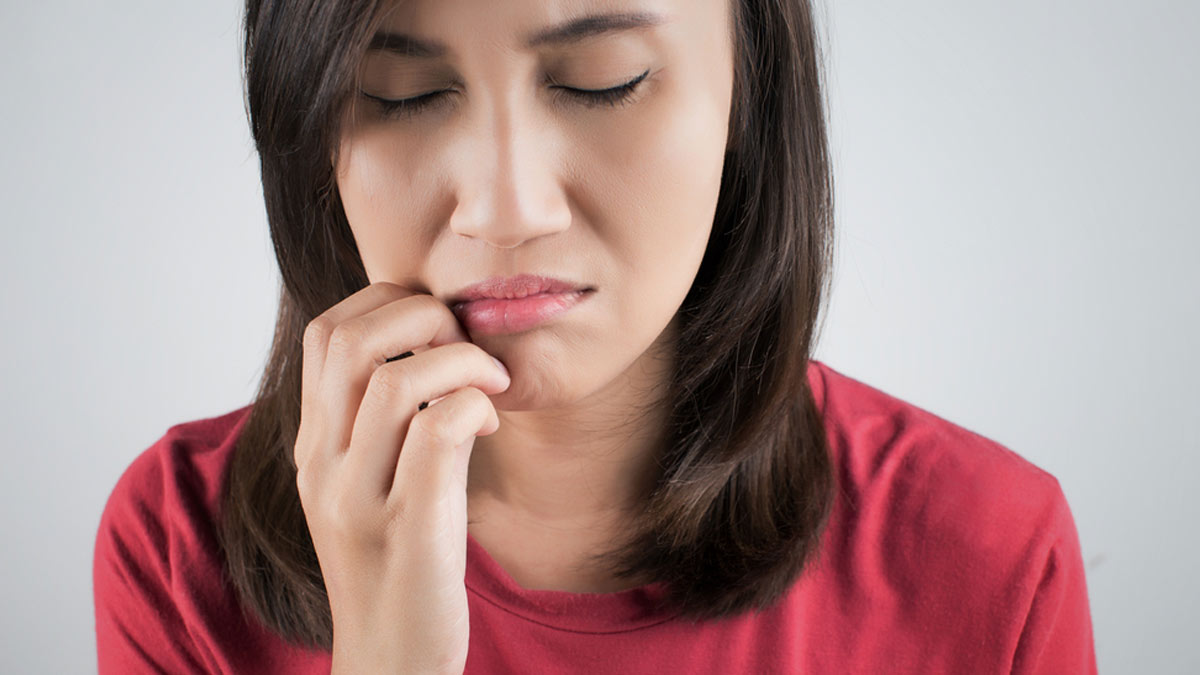
Some people cannot help but chew on the insides of their cheeks. This could either be a habitual behaviour that develops over time or can hint at a more concerning psychological issue, such as Obsessive-Compulsive Disorder (OCD), according to Dr Aravind MS, MD and Associate Professor, Oral Medicine and Maxillofacial Radiology, Amrita School of Dentistry, Kochi.
Table of Content:-
While accidental cheek biting is harmless and will heal over time, chronic cheek biting, also known as 'Morsicatio Buccarum,' can lead to complications that you must address. Many people who bite the insides of their cheeks also worry whether it could lead to cancer. Let's find out how much of this is accurate.
Also Read: Mouth Ulcers Could Signal Vitamin B12 Deficiency: Other Oral Signs To Watch Out For
What Causes Chronic Cheek Biting?

Speaking with the OnlyMyHealth team, Dr Sanmit Joshi, Consultant, Oral and Maxillofacial Surgery - Jaslok Hospital and Research Centre, Mumbai, shares some of the most common causes of chronic cheek biting, which include:
- Malocclusion of the teeth, in which the teeth are misaligned or do not fit together properly.
- Sharp edges of teeth due to tooth decay or mechanical and chemical erosion.
- Impacted third molar
- Missing tooth or teeth, which causes migration of adjoining and opposing teeth, leading to malalignment
- Psychological issues, such as stress and anxiety, can cause people to bite their cheeks or inner lips.
In more severe cases, chronic cheek biting can also be associated with depression, according to a 2019 study published in the Journal of the Pakistan Medical Association (JPMA).
Moreover, the Diagnostic and Statistical Manual of Mental Disorders, 5th edition (DSM-5) classifies chronic cheek biting as a body-focused repetitive disorder, a subcategory of obsessive-compulsive and related disorders.
Potential Risks Of Cheek Biting

Chronic cheek biting can cause repeated injuries to the tissues inside the mouth. The area can become scarred and pale, and it may even thicken. In certain cases, the surrounding tissues may even become inflamed, leading to purple spots, according to Medical News Today.
Some of the common consequences of repeated and long-term cheek-biting include:
- Repeated ulcer
- Pain and discomfort
- Irritational fibrosis, or fibrokeratosis, which can cause non-malignant, greyish white patches
- A lump (irritational fibroma)
Dr Aravind adds that some people may also develop dental problems, such as tooth decay, gum disease, and tooth sensitivity.
Can Chronic Cheek Biting Lead To Cancer?

According to a 2017 study published in the International Journal of Dentistry, cheek biting alone cannot cause oral cancer, although the habit may worsen previously existing oral cancer.
Dr Joshi says, "If a patient has any habits in the form of tobacco chewing, smoking, or alcohol consumption, the chances of malignant transformation are higher." This suggests that chronic irritation can cause cancer in high-risk individuals.
Also Read: Dry Mouth Can Be A Sign Of Diabetes: Other Symptoms In Your Mouth That Could Indicate The Disease
Tips To Stop Biting Your Cheeks
Here are some strategies to manage chronic cheek biting:
- Recognise triggers that lead to cheek biting.
- Use a mouth guard, as it can help prevent the cheek from getting caught between the teeth.
- Practise mindfulness, such as deep breathing or meditation.
- Cognitive Behavioral Therapy (CBT), a type of therapy that can help you identify and change negative thought patterns and behaviours
- Habit Reversal Training (HRT), a behavioural therapy that involves identifying the cues and behaviours associated with cheek biting and replacing the behaviour with a more positive one.
Conclusion
Chronic cheek biting is mostly harmless but can be painful and discomforting. It is either habitual or a result of an obsessive-compulsive disorder that requires appropriate guidance from a mental health professional. It is important to note that cheek biting alone cannot cause cancer. However, other factors, such as alcohol intake and smoking, can increase your risk.
Also watch this video
Read Next
Divyanka Tripathi To Undergo Surgery After Arm Fracture; Understanding Adult Forearm Fractures
How we keep this article up to date:
We work with experts and keep a close eye on the latest in health and wellness. Whenever there is a new research or helpful information, we update our articles with accurate and useful advice.
Current Version